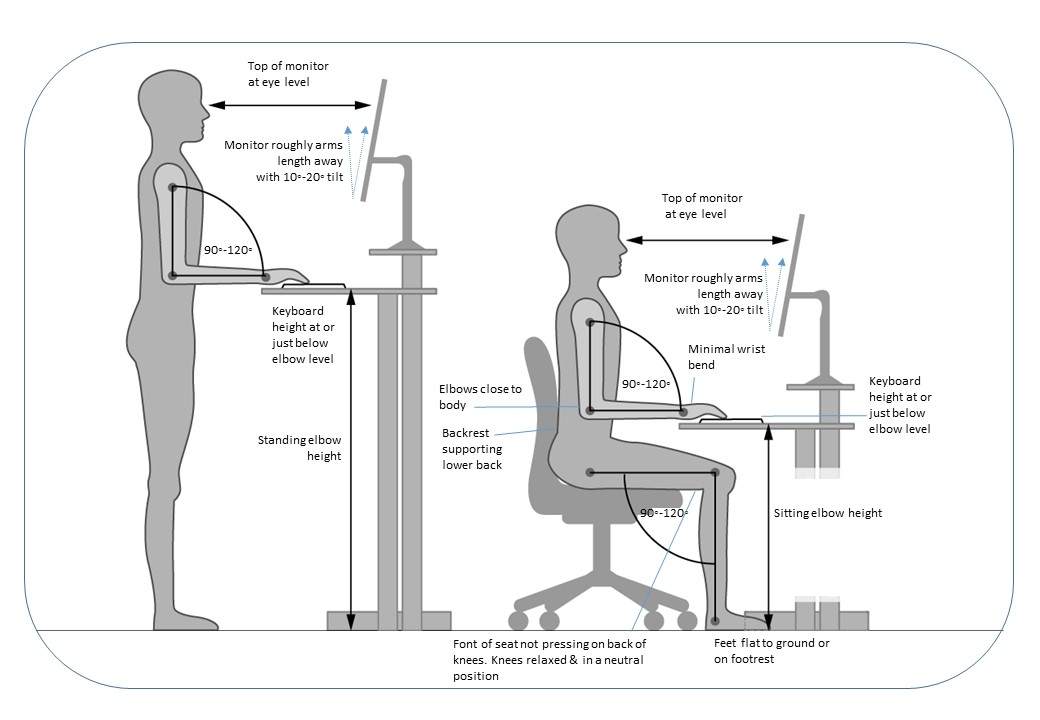Use the diagram to see what factors we consider when setting up your desk. The distance between the front of your seat pan and the back of your knee should be at least 2 cm.
Ergonomic Workstation Setup Diagram, Hover over each number to see how you can properly set up your workstation. When setting up the position of workstation furniture it is important to experiment and try new positions to find the.

Guidance regarding specific workstation dimensions, taking into Clear leg space should be provided under all desks where operators sit (eg free from desk legs, under desk cupboards etc). For optimal workstation design, it’s important to follow recommendations on proper ergonomics for vision as well. Keep your mouse next to and parallel to the keyboard as much as possible.
Set the top of screen to eye level.
Use inflatable cushions or small pillows if necessary. Once you have gotten that position down, you will start to notice what items in your workstation need modifying. Based on your height, consider these adjustable desk products. Do your armrests allow you to get close to your workstation? Start with making the conscious effort to maintain an upright position with your shoulders back and your neck upright (your chin should be making a 90 degree angle with your neck). Adjust the support in your backrest to fit it with the curve of your lower back.
 Source: shavitech.com
Source: shavitech.com
Desk make sure the desk can accommodate all equipment and material that is required for the tasks. The following are the design considerations. “measurements of an rpa around 75cm or 30” and an rpv around 80cm or 32” are close enough in value to make setting up the proper viewing distance for office ergonomics a simple process. O use a.
 Source: pinterest.co.uk
Source: pinterest.co.uk
Hover over each number to see how you can properly set up your workstation. Obtain a footrest as per the diagram. Align the monitor and the keyboard/mouse. O rest the feet on the floor or a stable footrest; Set the top of screen to eye level.
 Source: hunterglobalbusinesssolutions.co.uk
Source: hunterglobalbusinesssolutions.co.uk
This etool* illustrates simple, inexpensive principles that will help you create a safe and comfortable computer workstation. Raise /lower workstation • raise or lower keyboard Additional focusing for depth may be required here. This provides you with forearm shoulder and neck support. Pull gently down with the right arm until you feel a stretch down the side of your neck.
 Source: ffmservices.com
Source: ffmservices.com
Set up an ergonomic workstation based on anthropometric data from the bifma g1 standard. Preventive workstation evaluations for all faculty and staff who use a computer four hours a day or more are (1) required by the campus health and safety guidelines for computer users, and (2) the responsibility of each department. For optimal workstation design, it’s important to follow.
 Source: blog.qoo10.sg
Source: blog.qoo10.sg
Align the monitor and the keyboard/mouse. The workstation should be large enough to conduct the required work comfortably, without excessive twisting, reaching or awkward upper body postures. Adjust the height of your chair so that your feet rest flat on the floor or on a footrest and your thighs are parallel to the floor. Elbows, forearm and wrist should be.
 Source: exerciseright.com.au
Source: exerciseright.com.au
This etool* illustrates simple, inexpensive principles that will help you create a safe and comfortable computer workstation. Choose a chair that supports your spinal curves. There was a 20page checklist on osha�s website that could be used by everyone to make sure their workstation was set up ergonomically, which is now being used in south america, canada, and even in.
 Source: bolderinsurance.com
Source: bolderinsurance.com
Choose a chair that supports your spinal curves. Set up an ergonomic workstation based on anthropometric data from the bifma g1 standard. This guide provides illustrations of proper workstation ergonomics and a checklist for implementation of these strategies as well as tips for prevention of repetitive stress injuries. Based on your height, consider these adjustable desk products. • adjust armrests.
 Source: jasonl.com.au
Source: jasonl.com.au
Place the center of the screen at a 15 degree down angle from your eyes with your neck only slightly bent holding your head perpendicular to the floor. You can differentiate between two vision areas: Keep your mouse next to and parallel to the keyboard as much as possible. Adjust the support in your backrest to fit it with the.
 Source: chrisbensen.blogspot.com
Source: chrisbensen.blogspot.com
O keep the wrists flat and straight in relation to forearms when Elbows, forearm and wrist should be level with, or slightly higher, than the desktop level. Hover over each number to see how you can properly set up your workstation. Always follow proper ergonomic guidelines for setting up the overall workstation: This guide provides illustrations of proper workstation ergonomics.
 Source: hunterglobalbusinesssolutions.co.uk
Source: hunterglobalbusinesssolutions.co.uk
For optimal workstation design, it’s important to follow recommendations on proper ergonomics for vision as well. Also make sure the monitors are both at the same level. The distance between the front of your seat pan and the back of your knee should be at least 2 cm. Diagram for setting up an ergonomic workstation posted on june 23, 2013.
 Source: sitspot.com.au
Source: sitspot.com.au
Once you have gotten that position down, you will start to notice what items in your workstation need modifying. The workstation should be large enough to conduct the required work comfortably, without excessive twisting, reaching or awkward upper body postures. Use a good chair with a dynamic chair back and sit back in this. Eye exercise 1 eye exercise 2.
 Source: ewiworks.com
Source: ewiworks.com
F in the field of view (red vision area), several objects can be seen in focus simultaneously without moving the eyes or head. Set the top of screen to eye level. Obtain a footrest as per the diagram. Creating a good ergonomic working arrangement is important to protecting your health. You can differentiate between two vision areas:
 Source: barkhamofficefurniture.co.uk
Source: barkhamofficefurniture.co.uk
The following are the design considerations. This provides you with forearm shoulder and neck support. Place your left arm behind you and your right arm on the side of your head. Workstation setup diagram neck exercise 1 neck exercise 2 shoulder exercise 1 shoulder exercise 2 wrist exercise 1 wrist exercise 2 circle shoulders forward several times, then backwards. You.
 Source: ipmot.ca
Source: ipmot.ca
Obtain a footrest as per the diagram. Use a good chair with a dynamic chair back and sit back in this. The following 10 steps are a brief summary of those things that most ergonomists agree are important. Based on your height, consider these adjustable desk products. Make sure your upper and lower back are supported.
 Source: ewiworks.com
Source: ewiworks.com
For optimal workstation design, it’s important to follow recommendations on proper ergonomics for vision as well. Always follow proper ergonomic guidelines for setting up the overall workstation: The distance between the front of your seat pan and the back of your knee should be at least 2 cm. “measurements of an rpa around 75cm or 30” and an rpv around.
 Source: techotv.com
Source: techotv.com
Values are rounded to the nearest whole number. Once you have gotten that position down, you will start to notice what items in your workstation need modifying. Creating a good ergonomic working arrangement is important to protecting your health. Desk make sure the desk can accommodate all equipment and material that is required for the tasks. Obtain a footrest as.
 Source: dawsoncreekeventscentre.com
Source: dawsoncreekeventscentre.com
If your desk is adjustable, adjust your chair to the correct height to allow your feet to relax on the floor then (and same applies when adjusting to a standing workstation) adjust the height of the desk to just below elbow height. Put your keyboard and mouse on a flat surface, directly in front of you about 10 to 15cms.
 Source: cleveland.com
Source: cleveland.com
“measurements of an rpa around 75cm or 30” and an rpv around 80cm or 32” are close enough in value to make setting up the proper viewing distance for office ergonomics a simple process. Set up an ergonomic workstation based on anthropometric data from the bifma g1 standard. 12 tips for an ergonomic computer workstation. This etool* illustrates simple, inexpensive.
 Source: wood-crafted.uk
Source: wood-crafted.uk
The workplace ergonomics reference guide. Use the diagram to see what factors we consider when setting up your desk. 12 tips for an ergonomic computer workstation. Eye exercise 1 eye exercise 2 workstation setup diagram neck exercise 1 neck exercise 2 shoulder exercise 1 shoulder exercise 2 wrist exercise 1 Based on your height, consider these adjustable desk products.
 Source: highspeedtraining.co.uk
Source: highspeedtraining.co.uk
Adjust the height of your chair so that your feet rest flat on the floor or on a footrest and your thighs are parallel to the floor. Obtain a footrest as per the diagram. Adjust armrests so your arms gently rest on them with your shoulders relaxed. Start with making the conscious effort to maintain an upright position with your.
 Source: ergopro.com
Source: ergopro.com
Start with making the conscious effort to maintain an upright position with your shoulders back and your neck upright (your chin should be making a 90 degree angle with your neck). This checklist is to assist you in setting up your workstation in line with basic ergonomic principles and to minimize the risk of a musculoskeletal disorder. Preventive workstation evaluations.
 Source: back2health4you.com
Source: back2health4you.com
O keep the wrists flat and straight in relation to forearms when This is a publication of the computer/electronic accommodations program (cap) work life wellness program. The workplace ergonomics reference guide. This guide provides illustrations of proper workstation ergonomics and a checklist for implementation of these strategies as well as tips for prevention of repetitive stress injuries. Millions of people.
 Source: inside.ewu.edu
Source: inside.ewu.edu
When setting up the position of workstation furniture it is important to experiment and try new positions to find the. Diagram for setting up an ergonomic workstation posted on june 23, 2013 by homesenseauditing a helpful diagram for setting up a comfortable and efficient work station at home, using ergonomic recommendations. “measurements of an rpa around 75cm or 30” and.
 Source: ptandme.com
Source: ptandme.com
The following 10 steps are a brief summary of those things that most ergonomists agree are important. Start with making the conscious effort to maintain an upright position with your shoulders back and your neck upright (your chin should be making a 90 degree angle with your neck). Place the center of the screen at a 15 degree down angle.
 Source: wrightpt.com
Source: wrightpt.com
Do your armrests allow you to get close to your workstation? In the diagram below you will find both sitting and standing workstation recommendations to achieve a proper ergonomic workstation. This provides you with forearm shoulder and neck support. Place the center of the screen at a 15 degree down angle from your eyes with your neck only slightly bent.










